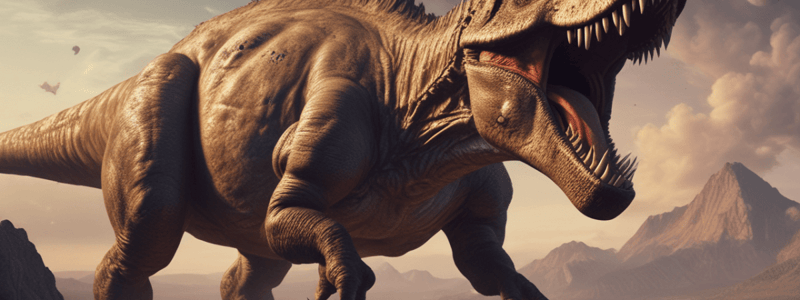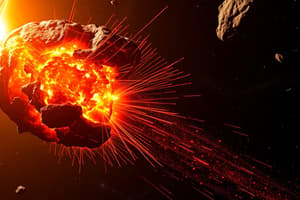Podcast
Questions and Answers
The asteroid that hit the Earth was approximately 20 kilometers in diameter.
The asteroid that hit the Earth was approximately 20 kilometers in diameter.
False (B)
The impact of the asteroid created a hole that was 20 kilometers wide.
The impact of the asteroid created a hole that was 20 kilometers wide.
False (B)
The energy released from the asteroid's impact was equivalent to that of a nuclear bomb.
The energy released from the asteroid's impact was equivalent to that of a nuclear bomb.
False (B)
The tsunami that ensued after the impact reached a height of 500 meters.
The tsunami that ensued after the impact reached a height of 500 meters.
All life on Earth was extinguished as a result of the asteroid impact.
All life on Earth was extinguished as a result of the asteroid impact.
The asteroid's impact caused an immediate drop in temperature by 50°C.
The asteroid's impact caused an immediate drop in temperature by 50°C.
About 90% of life on Earth went extinct after the asteroid impact.
About 90% of life on Earth went extinct after the asteroid impact.
The sulfur in the asteroid impact created a toxic gas that killed the dinosaurs.
The sulfur in the asteroid impact created a toxic gas that killed the dinosaurs.
The likelihood of another Chicxulub-sized asteroid striking in the next thousand years is about 50%.
The likelihood of another Chicxulub-sized asteroid striking in the next thousand years is about 50%.
Only small mammals survived the asteroid impact.
Only small mammals survived the asteroid impact.
Flashcards are hidden until you start studying
Study Notes
The Chicxulub Asteroid Impact
- 66 million years ago, a massive asteroid (12 km wide) struck the Yucatán Peninsula at 20 km/s, causing a massive extinction event.
- The impact created a 100 km wide hole, ejecting sedimentary and crystalline rocks, and triggered a massive collapse of the crater.
Immediate Effects of the Impact
- The energy released was equivalent to several billion nuclear bombs.
- Seismic energy was sent across the planet, causing massive landslides and a tsunami potentially reaching 1,500 meters high.
- Countless lives were extinguished, with all life within 1,500 km of the impact site incinerated instantly.
Long-term Consequences
- The asteroid sent hundreds of gigatons of carbon-dioxide-rich limestone and sulfur-saturated-sediments into the atmosphere, blocking the Sun and causing an extended period of darkness.
- The temperature in many places dropped by at least 25°C, leading to the collapse of food webs worldwide.
- An estimated 75% of life on Earth went extinct, including almost all dinosaurs.
Surviving Lifeforms
- Small birds, insects, early mammals, and photosynthetic lifeforms like algae survived the extinction event.
- These organisms likely survived due to their ability to adapt to the new environment, such as relying on hardy seeds or withstanding low-light conditions.
Modern Implications
- The likelihood of another Chicxulub-like event in the next thousand years is small (7 in a million).
- However, humanity is facing rapid climate change due to its own emissions, leading to animal extinctions and displacement of people.
- Unlike the dinosaurs, humans have the opportunity to avoid large-scale devastation by changing their behavior.
Studying That Suits You
Use AI to generate personalized quizzes and flashcards to suit your learning preferences.




